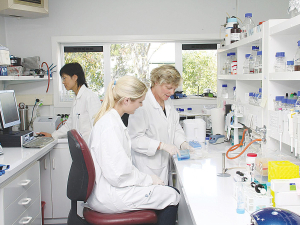'Living labs' to tackle emissions
Living labs that bring together expertise at locations around New Zealand are among potential solutions identified by researchers to help the country move towards a more climate resilient future.
 Nearly $12m has been committed over five years to a programme looking into improvements in plant-based foods.
Nearly $12m has been committed over five years to a programme looking into improvements in plant-based foods.
Crown research institute AgResearch has received close to $13 million in government funding to help advance opportunities for New Zealand in both plant-based food ingredient and cell-based protein markets.
Nearly $12m has been committed over five years to a programme looking into improvements in plant-based foods.
It will also be used to research how a plant-based foods industry could operate in New Zealand using crops known to grow well locally, like green peas, oats and hemp.
AgResearch senior scientist Alistair Carr says arable crops already provide most of the calories in people's diets and have good sustainability and animal welfare credentials. He adds that food manufacturers have come out with many novel plant-based products.
"However, these are often highly refined and stripped of their whole-food benefits and can have hidden damage to essential amino acids. The next generation of plant-based foods will need to be prepared more sensibly with gentler handling of the inherently healthy raw materials and better guardianship of environmental impact."
Carr says AgResearch has gathered some of the brightest minds in process engineering, food science, sustainability evaluation, economic analysis and human nutrition. He says the goal is to support NZ's arable crop processors, as well as entrepreneurs in the emerging proteins sector to make New Zealand a premier supplier of high value plant-based food ingredients.
"New Zealand can participate in this opportunity by developing the science and technologies to produce unique highly functional plant foods."
Meanwhile, the second programme - with just under $1m in funding over three years, will focus on the use of technologies to advance NZ's cell-based protein industries. For example, meat that may be grown from animal cells.
AgResearch science team leader Gale Brightwell says that while it is an exciting time for cellular agriculture, there are still major challenges to overcome.
"The biggest barriers are the cost of large-scale manufacture including the use of food-grade growth media (substances in which the cells can be grown), loss of cell lines due to biological contamination and high requirements for food safety testing."
She adds that, to date, no large-scale, cost-effective technology is available to maintain sterility for cell-based protein manufacture nor an online monitoring system to detect changes in quality and safety.
This will be where the research comes in, drawing on cold plasma, hyperspectral imaging and machine learning technologies to help ensure sterility is maintained and any contamination is rapidly detected and responded to in the production process.
"The research will result in the development of new knowledge, IP and technologies that can significantly enhance the sustainability, safety, and ethical appeal of emerging NZ cellular agricultural companies," Brightwell explains.
Nine lucky school leavers passionate about farming will join Pamu for a two-year journey into agriculture, living and working at Pamu farm, Aratiatia near Taupo.
Nutritionists are urging Kiwis to kickstart their day with a piece of fresh fruit to help improve their health and wellbeing this autumn.
Under its innovation strategy, Craigmore Sustainables says it is collaborating with new innovators of technology across sustainability, people, animals and business management to enhance New Zealand's dairy sector.
Deeply cynical and completely illogical. That's how Kimberly Crewther, the executive director of DCANZ is describing the Canadian government's flagrant breach of international trade law in refusing to open its market to New Zealand dairy exports.
This week the winner of the prestigious Ahuwhenua Trophy for the top Māori Dairy farm will be announced at a gala dinner in Hamilton.
Once-a-day milking (OAD) can increase or lower the amounts of proteins in milk, according to a new study published in the journal Dairy.